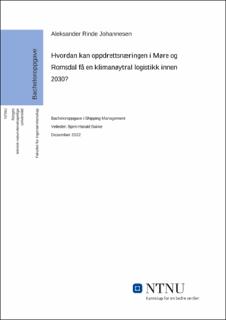| dc.contributor.advisor | Bakke, Bjørn Harald | |
| dc.contributor.author | Johannesen, Aleksander Rinde | |
| dc.date.accessioned | 2023-01-31T18:19:58Z | |
| dc.date.available | 2023-01-31T18:19:58Z | |
| dc.date.issued | 2022 | |
| dc.identifier | no.ntnu:inspera:131835269:133496018 | |
| dc.identifier.uri | https://hdl.handle.net/11250/3047569 | |
| dc.description.abstract | Sammendrag
Norsk oppdrettsnæring står fremfor en spennende utvikling ved stadig skjerpende utslippskrav fra myndighetene og kunder som blir mer og mer opptatt av klimaavtrykket på produktene de kjøper i butikkene. De to faktorene og det faktumet at næringen selv ønsker å bli mer miljøvennlig legger grunnlaget for oppgaven. I oppgaven fokuseres det på transport av oppdrettet laks og ørret samt transportmetoder. Det er gjennomført to caseundersøkelser fra tre ulike bedrifter i næringen samt blitt brukt offentlig datamateriale.
Oppgavens struktur starter med en kort inndeling av innhold med problemstilling og forskningsspørsmål. I del to av oppgaven blir det teoretiske grunnlaget bli fremlagt hvor en får innsikt i transport, oppdrettsnæringen og både nasjonale og internasjonale miljøkrav. Videre i del tre vil caseundersøkelsen bli introdusert hvor resultatene fra hver casebedrift blir presentert for videre diskusjon. Avslutningsvis vil problemstillingen drøftes og konkluderes i del fem.
Problemstillingen «Hvordan kan oppdrettsnæringen i Møre og Romsdal få en klimanøytral logistikk innen 2030?» har blitt besvart. En av hovedtrekkene bak konklusjonen er at norsk oppdrettsnæring behøver å se på alternativer til flytransport. Dette foreslås ved at en reduserer eksporten av fersk fisk på fly og fremfor frakter fryst fisk ved bruk av containerskip. Gjennomføringen av et slikt skifte krever bruken av sofistikerte nedfrysningsmetoder slik at kvaliteten på produktet er tilsvarende likt som ved bruken av fersk flyfrakt. Videre vil det bli sett på hvordan næringen samlet kan gå frem for å oppnå dette ved å se på små og store oppdrettere. De minste oppdretterne vil ha størst utbytte av å sende store forsendelser og pakke produktet så effektivt som mulig, samt gjøre investeringer i foredlingsfabrikker slik at energibruken minskes. | |
| dc.description.abstract | Summary
The Norwegian fish farming industry is facing an exciting development due to ever-tightening emission requirements from the authorities and customers who are becoming more and more concerned with the climate footprint of the products they buy in the shops. The two factors and the fact that the industry itself wants to become more environmentally friendly lay the foundation for the task. The thesis focuses on the transport of farmed salmon and trout as well as transport methods. Two case studies have been carried out from three different companies in the industry and public data material has been used.
The structure of the assignment starts with a brief division of content with problem and research questions. In part two of the thesis, the theoretical basis will be presented where one will gain insight into transport, the fish farming industry and both national and international environmental requirements. Furthermore, in part three, the case study will be introduced where the results from each case company will be presented for further discussion. Finally, the problem will be discussed and concluded in part five.
The problem "How can the fish farming industry in Møre and Romsdal have climate-neutral logistics by 2030?" has been answered. One of the main features behind the conclusion is that the Norwegian aquaculture industry needs to look at alternatives to air transport. This is proposed by reducing the export of fresh fish by air and instead transporting frozen fish using container ships. Carrying out such a shift requires the use of sophisticated freezing methods so that the quality of the product is like that of using fresh air freight. Furthermore, it will be looked at how the industry can proceed to achieve this by looking at small and large companies. The smallest companies will benefit the most from sending large consignments and packaging the product as efficiently as possible, as well as investing in processing factories so that energy use is reduced. | |
| dc.language | nob | |
| dc.publisher | NTNU | |
| dc.title | Hvordan kan oppdrettsnæringen i Møre og Romsdal få en klimanøytral logistikk innen 2030? | |
| dc.type | Bachelor thesis | |
